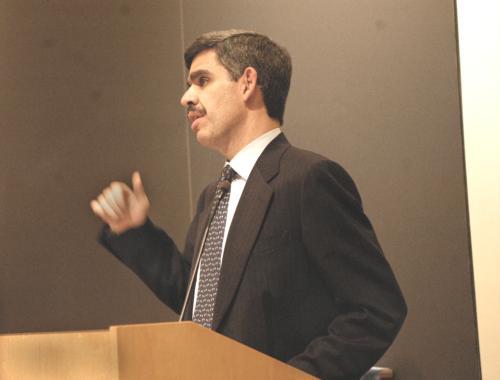
News
Harvard Researchers Develop AI-Driven Framework To Study Social Interactions, A Step Forward for Autism Research

News
Harvard Innovation Labs Announces 25 President’s Innovation Challenge Finalists

News
Graduate Student Council To Vote on Meeting Attendance Policy

News
Pop Hits and Politics: At Yardfest, Students Dance to Bedingfield and a Student Band Condemns Trump

News
Billionaire Investor Gerald Chan Under Scrutiny for Neglect of Historic Harvard Square Theater
Endowment Chief Speaks to Students

The world is witnessing a gradual “realignment of economic power” in the face of unprecedented global imbalances that defy textbook explanations, said Harvard’s endowment chief yesterday in his first appearance before students.
Mohamed A. El-Erian, the new chief executive of the Harvard Management Company (HMC), addressed a friendly crowd of roughly 100 students for about an hour in a speech sponsored by the Harvard International Business Club and the Harvard Society of Arab Students in Boylston Hall’s Fong Auditorium.
The dialogue played to El-Erian’s strengths, remaining firmly rooted in a macroeconomic discussion of global imbalances and emerging markets while completely avoiding thorny issues such as compensation levels that have hovered around HMC in the past few years.
The warm reception received by El-Erian was in stark contrast to a similar speech given by former HMC chief Jack R. Meyer in Lamont Library slightly over two years ago. Meyer was greeted outside by protestors outraged by multi-million dollar salaries paid to endowment managers, and faced questions about HMC’s external management and compensation structures. El-Erian, who has told The Crimson that both will remain unchanged, faced a welcoming audience as he expressed bold views.
“What I’m going to be talking about is something that would have been unthinkable three or four years ago, and today it’s starting to gather momentum,” said El-Erian.
He said that while financial analysts were fixated on ‘mean reversion’—an assumption that aberrations in financial markets would correct themselves in due time—many are missing large structural changes that are realigning world markets.
El-Erian offered a number of hypothesis centered around the idea that a new set of countries are emerging with systemic importance that have far-reaching implications.
“How do you know...when conventional wisdom fails, when your models can no longer explain what’s going on, when words like conundrums, puzzles, aberrations appear in the Financial Times,” he said.
He cited as examples the ‘interest-rate conundrum’—the fact that long-term interest rates have failed to rise with hikes in short-term rates—the presence of oil prices at $70 a barrel without “stag” or “flation” in the economy, and the unprecedented flow of capital from developing nations to the first world.
Textbooks, he said, would indicate that “by their very nature” developing countries should be borrowing rather than lending.
But solid growth, low inflation, and high currency reserves in developing nations amounted to a situation that would otherwise be deemed impossible, he concluded.
While he expressed confidence that there were opportunities for HMC in emerging markets, El-Erian said he felt that overly protectionist policy by the U.S., policy mistakes by the Federal Open Market Committee, and a hard-landing to the Chinese economy could be problematic for the world’s ‘stable disequilibrium.’ He also said that the US housing market poses a significant risk.
El-Erian, who holds a doctorate in economics from Oxford University, joined HMC in mid-February from Pacific Investment Management Company (PIMCO) after having served as a senior official at the International Monetary Fund and as head of emerging market research at Salomon Smith Barney/Citibank.
El-Erian said that many people had trouble understanding his decision to leave PIMCO, where he was chief of the $28 billion emerging markets portfolio.
“Part of the reason why I left southern California is to interact with the Harvard community, so hopefully this will not be the first and last interaction,” he said. “I hope this will be one of many.”
—Staff writer Cyrus M. Mossavar-Rahmani can be reached at crahmani@fas.harvard.
Want to keep up with breaking news? Subscribe to our email newsletter.
From Our Advertisers

Over 300+ courses at prestigious colleges and universities in the US and UK are at your disposal.

Where you should have gotten your protein since 1998.

Serve as a proctor for Harvard Summer School (HSS) students, either in the Secondary School Program (SSP), General Program (GP), or Pre-College Program.

With an increasingly competitive Law School admissions process, it's important to understand what makes an applicant stand out.

Welcome to your one-stop gifting destination for men and women—it's like your neighborhood holiday shop, but way cooler.

HUSL seeks to create and empower a community of students who are seeking pathways into the Sports Business Industry.
